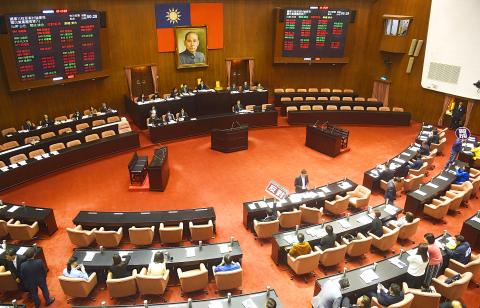A “same-sex union” bill drafted by HTC chairwoman Cher Wang’s (王雪紅) Faith, Hope and Love Foundation and sponsored by Democratic Progressive Party (DPP) Legislator Lin Tai-hua (林岱樺) yesterday advanced to a second reading.
The DPP caucus at a plenary session successfully moved to advance the bill, titled the “draft enforcement act for Judicial Yuan Interpretation No. 748 and Referendum No. 12,” to a second reading.
The New Power Party caucus filed a separate motion to return the bill to the Procedural Committee, which was struck down.

Photo: Huang Yao-cheng, Taipei Times
The result was in line with a decision reached during cross-caucus negotiations on Thursday that all three bills on the issue be reviewed side-by-side during another round of negotiations.
DPP caucus whip Ker Chien-ming (柯建銘) said that the next round of negotiations could begin next week, as the deadline set by the interpretation nears.
It is to be reviewed alongside the Executive Yuan’s “enforcement act of Judicial Yuan Interpretation No. 748” and another sponsored by Chinese Nationalist Party (KMT) Legislator Lai Shyh-bao (賴士葆) on behalf of the conservative Happiness of the Next Generation Alliance, both of which proceeded to a second reading in March.
Referendum No. 12, which was voted on alongside the nine-in-one elections on Nov. 24 last year, asked voters: “Do you agree that the right to persons of the same sex to create a permanent union should be guaranteed by an institution other than marriage as defined by the Civil Code?”
It passed after garnering 6.4 million “yes” votes to 4.07 million “no” votes.
Lin’s version of the bill uses the term “same-sex union,” while the Cabinet’s version uses “same-sex marriage.”
The latter is in line with the Council of Grand Justices’ interpretation passed on May 24, 2017, which declared the lack of language guaranteeing the right of same-sex couples to get married in the Civil Code unconstitutional, and required that a law or amendment be introduced to legalize same-sex marriage within two years.
Although supporters of Lin’s version have said that it is a compromise between the other two versions, DPP legislators Yu Mei-nu (尤美女) and Tuan Yi-kang (段宜康) said otherwise.
Yu on Thursday called Lin’s version “stark discrimination” against same-sex couples.
The version contains a “fake marriage” clause that would authorize prosecutors or social welfare agencies to request that a court intervene and abrogate a same-sex union if relatives within three degrees of consanguinity of either member of the union believe that it was not for the purpose of two people “living life together,” Yu said on Facebook, questioning what right people have to scrutinize the sincerity of others’ marriage.
The version also has a clause that says: “As one’s conscience and freedom should not be affected by the enactment of this act, conveying or inculcating beliefs against the relationship described in Article 2 [same-sex union] does not constitute discrimination,” she said.
Tuan said that he despises all lawmakers who sponsored or cosponsored the bill, regardless of their party affiliation.

INVESTIGATION: The case is the latest instance of a DPP figure being implicated in an espionage network accused of allegedly leaking information to Chinese intelligence Democratic Progressive Party (DPP) member Ho Jen-chieh (何仁傑) was detained and held incommunicado yesterday on suspicion of spying for China during his tenure as assistant to then-minister of foreign affairs Joseph Wu (吳釗燮). The Taipei District Prosecutors’ Office said Ho was implicated during its investigation into alleged spying activities by former Presidential Office consultant Wu Shang-yu (吳尚雨). Prosecutors said there is reason to believe Ho breached the National Security Act (國家安全法) by leaking classified Ministry of Foreign Affairs information to Chinese intelligence. Following interrogation, prosecutors petitioned the Taipei District Court to detain Ho, citing concerns over potential collusion or tampering of evidence. The

Seventy percent of middle and elementary schools now conduct English classes entirely in English, the Ministry of Education said, as it encourages schools nationwide to adopt this practice Minister of Education (MOE) Cheng Ying-yao (鄭英耀) is scheduled to present a report on the government’s bilingual education policy to the Legislative Yuan’s Education and Culture Committee today. The report would outline strategies aimed at expanding access to education, reducing regional disparities and improving talent cultivation. Implementation of bilingual education policies has varied across local governments, occasionally drawing public criticism. For example, some schools have required teachers of non-English subjects to pass English proficiency

NEGOTIATIONS: The US response to the countermeasures and plans Taiwan presented has been positive, including boosting procurement and investment, the president said Taiwan is included in the first group for trade negotiations with the US, President William Lai (賴清德) said yesterday, as he seeks to shield Taiwanese exporters from a 32 percent tariff. In Washington, US Trade Representative Jamieson Greer said in an interview on Fox News on Thursday that he would speak to his Taiwanese and Israeli counterparts yesterday about tariffs after holding a long discussion with the Vietnamese earlier. US President Donald Trump on Wednesday postponed punishing levies on multiple trade partners, including Taiwan, for three months after trillions of US dollars were wiped off global markets. He has maintained a 10 percent

TRADE: The premier pledged safeguards on ‘Made in Taiwan’ labeling, anti-dumping measures and stricter export controls to strengthen its position in trade talks Products labeled “made in Taiwan” must be genuinely made in Taiwan, Premier Cho Jung-tai (卓榮泰) said yesterday, vowing to enforce strict safeguards against “origin laundering” and initiate anti-dumping investigations to prevent China dumping its products in Taiwan. Cho made the remarks in a discussion session with representatives from industries in Kaohsiung. In response to the US government’s recent announcement of “reciprocal” tariffs on its trading partners, President William Lai (賴清德) and Cho last week began a series of consultations with industry leaders nationwide to gather feedback and address concerns. Taiwanese and US officials held a videoconference on Friday evening to discuss the